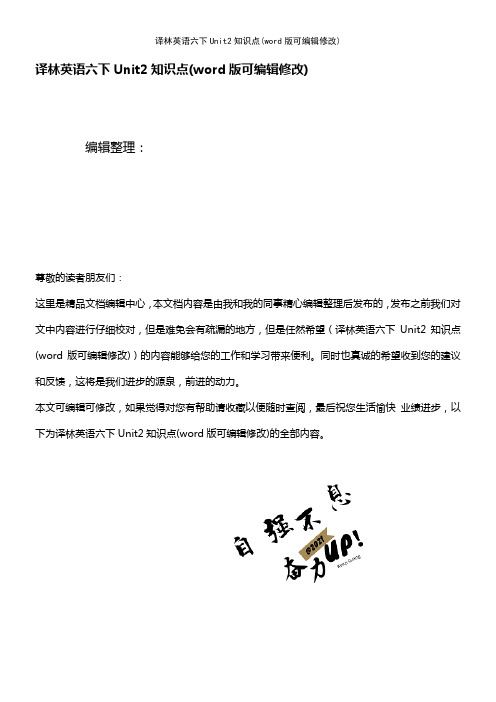六年级英语下册Unit2知识点汇总(新版牛津译林苏教版)【DOC范文整理】
- 格式:docx
- 大小:17.61 KB
- 文档页数:5

苏教版六年级英语Unit2知识点归纳在苏教版六年级英语Unit2中,有许多知识点需要我们归纳总结。
本文将按照合适的格式,详细介绍这些知识点。
一、名词的复数形式英语中,名词的复数形式有很多规则。
比如,大部分名词加s,有些名词以-s、-sh、-ch、-x或-z结尾,在末尾加es;以辅音字母加y结尾的名词,变y为i,再加es等等。
二、不规则动词的过去式英语中有一些动词的过去式不规则。
如:go- went,have-had,do-did等等。
我们要通过大量的练习来记住这些不规则动词的过去式。
三、系动词be的用法系动词be有三种形式,即am、is和are,用来表达人称和单复数。
比如:I am happy. They are my friends.等等。
四、形容词的比较级与最高级形容词的比较级和最高级可以通过在形容词后加-er和-est来构成,也可以加more和most来表示。
比如:big-bigger-biggest,beautiful-more beautiful-most beautiful。
五、询问和回答有关年龄和物品所有权的句子在英语中,询问别人的年龄可以用"How old are you?",询问物品所有权可以用"Whose is it?"等等。
回答这些问题时要根据具体情况给出合适的答案。
六、物品描述英语中,我们可以使用形容词和名词来描述物品的外观、颜色、大小等特征。
比如:a round ball, a red apple等等。
七、日常交际用语英语中的日常交际用语非常重要。
比如问候、感谢、道歉等等。
我们要学会使用这些用语来和他人进行交流。
八、介词英语中的介词在句子中起连接作用,表示位置、方向、时间等。
常见的介词有in, on, at, from, to等等。
九、表示频率的副词在英语中,我们可以使用副词来表示某件事情的频率。
比如:always, often, sometimes等。

六下知识梳理Unit 2 Good habits一、词汇:1. habit 习惯2. never 从不3. late 迟,晚4. finish完成5. tidy干净的,整齐的6. fast 快地7. slowly 慢速地8. bad不好的9. badly 差地,不好10. sleepy 困的11. early 早地12. well 好地13. good 好的二、词组:1. put… in order 把……整理得井井有条2. last night昨夜3. go into走进,进入4. brush (one’s) teeth 刷牙5. finish one’s homework完成家作6. before bedtime 睡觉前7. do well 做得好8. keep his room clean and tidy 保持他的房间干净整齐9. listen to his teacher 听他的老师的话10. help his parents 帮助他的父母11. know well 非常了解12. walk fast 走得快13. feel sleepy感到困的14. have some good / bad habits 有一些好/坏的习惯15. on time 准时16. show… around 带……参观17. be good at …擅长……18.do well in…(某方面)学/做得好,擅长……19. pour… into…把……倒进……20.listen carefully in class 听课认真三、语法和句型always 频率最大,usually频率仅次于always,often不如usually那么频繁,sometimes频度比often 小,表示动作偶尔发生,间断较大。
e.g. I always have breakfast on time.We usually finish our homework before dinner.They often do their homework in the evening.He sometimes feels sleepy in the morning.She never goes to bed late.2. 本课中还出现了以下常用副词:early, late, well, hard, fast等四、语音or / / morning shorts before order五、拓展词汇:untidy(不整洁)句型:I always get up early every morning.主语+频率副词+动词+副词+时间或地点。

Unit2Good habits一、重点单词习惯habit干净的;整齐的tidy快的fast从不never迟的late完成finish差的badly困的sleepy慢速地slowly二、重点短语1、a good boy一个好男孩2、have many good habits有许多好习惯一个坏习惯a bad habit3、get up early in the morning在早晨早早得起床4、never go to bed late从不晚睡觉5、go to bed early早早睡觉6、before bedtime睡前7、go to bed late last night昨晚很晚睡觉8、finish his homework完成家庭作业9、finish primary school小学毕业10、before dinner在晚饭前11、after lunch午饭后12、shouldn’t go home late不应该晚回家13、do well at home在家做得好14、keep his room clean and tidy保持房间干净并整洁15、also help his parents do housework也帮助他的父母亲做家务16、do his homework late at night在晚上家庭作业做得晚17、brush his teeth刷他的牙齿18、feel sleepy感觉困倦19、know her well非常了解她20、always put things in order总是把东西摆得井井有条21、walk fast/slowly走得快/慢22、run very fast跑得非常快23、listen to his teacher at school在学校听老师讲24、have breakfast on time准时吃早饭25、short horses矮矮的马26、run through the grass(跑)穿过草丛27、wash your face at seven o’clock在七点洗你的脸28、come to see her来看她29、show you around the house带你参观房子30、go into the living room进入起居室31、big and clean又大又干净32、small and nice小而干净33、a lot of books and toys许多书和玩具34、on the floor在地上35、under the bed在床下36、put your books and toys in order把你的书和玩具整理好37、sing badly唱得不好38、do badly做得不好39、swim well游得好40、pick one挑一个41、pick up捡起来(pick it up/pick them up)42、pick apples摘苹果43、in the street在街上三、重要知识点动词第三人称单数变化规则(1)直接在动词后+slike-likes play-plays(2)以s,x,sh,ch接尾的动词+eswash-washes watch-watches brush-brushes(3)以辅音+o接尾的动词:+esgo-goes do-does(4)以辅音+y接尾的动词:变y为i+esfly-flies study→studiesEg:用所给词的适当形式填空(一般现在时)1.She______(do)homework by herself.2.Jack______(go)home by bike.3.The giant______(climb)up the beanstalk(豆茎).4.Her mum______(run)to the goose.5.He______(do not)like apple副词和频率副词1.副词的分类I always have breakfast on time.(on time意为“按时,准时”)(1)时间副词:常见的有now,then,soon,ago,lately,later,before,early,today,tomorrow, yesterday,tonight,suddenly,still,just等。

苏教版译林版英语六年级上下两册知识点汇总整理归纳(2)(word版可编辑修改)编辑整理:尊敬的读者朋友们:这里是精品文档编辑中心,本文档内容是由我和我的同事精心编辑整理后发布的,发布之前我们对文中内容进行仔细校对,但是难免会有疏漏的地方,但是任然希望(苏教版译林版英语六年级上下两册知识点汇总整理归纳(2)(word版可编辑修改))的内容能够给您的工作和学习带来便利。
同时也真诚的希望收到您的建议和反馈,这将是我们进步的源泉,前进的动力。
本文可编辑可修改,如果觉得对您有帮助请收藏以便随时查阅,最后祝您生活愉快业绩进步,以下为苏教版译林版英语六年级上下两册知识点汇总整理归纳(2)(word版可编辑修改)的全部内容。
苏教版译林版英语六年级上册知识点汇总Unit 1 The king’s new clothes一,单词/词组1. long long ago 很久以前2。
new clothes 新衣服3。
make new clothes for you 为你制作新衣服 make sth for sb4。
show the king his new clothes给皇帝展示新衣服show sb. sth。
= show sth。
to sb。
5.try on 试穿try on the coat=try the coat on try it/them6。
magic clothes 有魔力的衣服7. walk through步行穿过8. in his new clothes 穿着他的新衣服9。
shout at sb。
对某人大叫10. laugh at sb. 对某人大笑11。
look at 看…。
12。
point at 指向…13。
fit well 非常适合 14. an American cowboy 一个美国牛仔15。
a Scottish man 一位苏格兰人16。
tell a story 讲一个故事17. say a/one sentence 说一句话 18. on the mountain 在山上19. the next sentence 下一句话 20。

译林英语六下Unit2知识点(word版可编辑修改)编辑整理:尊敬的读者朋友们:这里是精品文档编辑中心,本文档内容是由我和我的同事精心编辑整理后发布的,发布之前我们对文中内容进行仔细校对,但是难免会有疏漏的地方,但是任然希望(译林英语六下Unit2知识点(word版可编辑修改))的内容能够给您的工作和学习带来便利。
同时也真诚的希望收到您的建议和反馈,这将是我们进步的源泉,前进的动力。
本文可编辑可修改,如果觉得对您有帮助请收藏以便随时查阅,最后祝您生活愉快业绩进步,以下为译林英语六下Unit2知识点(word版可编辑修改)的全部内容。
Unit2 Good habits一、词组【四会词组】1。
good habits 好习惯2。
bad habits 坏习惯3。
never go to bed late从不晚睡觉4。
walk fast 快速地走4。
finish his homework before dinner 晚饭前完成他的作业6。
keep his room clean and tidy 保持他的房间又干净又整洁【三会词组】1. try to form good learning habits 试着形成好的学习习惯2。
get up early in the morning早上早早地起床 3. before bedtime睡觉前4. put his things in order把他的东西放得井井有条5。
at home在家6。
feel sleepy in the morning早上觉得困7.do well at home在家做得好8. know Liu Tao well很了解刘涛9. last night昨晚10。
go into Tina's bedroom进入蒂娜的卧室11。
do badly at school在学校做得不好12。
run slowly跑得慢二、句子【四会句子】1。

六年级英语下册Unit 2知识点汇总(新版牛津译林苏教版)六年级英语下册Unit2知识点汇总(新版牛津译林苏教版)Unit2Gdhabits知识汇总一、四会单词、habit适应二、tid干净的;整齐的3、fast快的4、never从不、late迟的成二、三会单词把……放得井井有条put…inrder不行的,坏的bad的sleep昨夜lastnight走进,走入gint慢速地sll好badl三、短语积存:、agdb一个好男孩二、haveangdhabits有许多好适应一个坏适应abadhabit3、getupearlintherning在早晨早早得起床4、nevergtbedlate从不晚睡觉、gtbedearl早早睡觉六、befrebedtie睡前7、gtbedlatelastnight昨晚很晚睡觉八、finishhisher完成家庭作业九、finishpriarshl小学毕业0、befredinner在晚餐前一、afterlunh午饭后二、shuldn’tghelate不该该晚回家3、dellathe在家做得好4、eephisrleanandtid维持房间干净并整洁六、finish 完困的,困倦差地,不3九、dbadl做得不行40、siell游得好4二、pine挑一个43、piup捡起来Piitup/pitheup43、piapples摘苹果4、inthestreet在街上三、重点句型Hegetsupearlintherningandnevergestbedlate他早上起床早,从来不晚睡。
2sisterbrusheshisteethintherningandbefrebedtie 我妹妹在早上和睡觉前刷牙。
3Ialasputthingsinrder我老是把我的东西整理得井井有条。
4eusuallfinishurherbefredinner咱们通常在晚餐之前完成家庭作业。
Thelistenttheirteahersatshl他们在学校听教师的话。
Unit 2 Good habits 知识点梳理一、四会单词1. habit 习惯2. never 从不3. late 迟,晚4. finish 完成5. tidy 干净的,整齐的6. fast快地二、三会单词1. bad 不好的,坏的2. sleepy 困得,困倦的3. slowly 慢速的地4. badly 差的,不好三、短语积累1. good habits 好习惯2. bad habits 坏习惯3. 16. get up early 起床早4. go to bed late 睡得晚5. brush his teeth(单数tooth) 刷牙6. before bedtime 睡觉前7. put … in order 8. finish his homework把……整理得井井有条完成他的家庭作业9. before dinner 吃饭前10. listen to his teachers 听他老师的11. do well 做得好12. keep…clean and tidy 保持……干净整洁13. help his parents 帮助他的父母14. do his homework late 迟做作业15. feel sleepy 感到困倦16. know him/her well 非常熟悉他/ 她17. last night 昨夜18.walk fast 走的快19. show… around 带领……参观20. run fast 跑得快21. sing badly 唱得不好22. go into 走进23. walk slowly 走得慢四、四会句型1. I walk fast in the street. 在街上,我走得快。
2. We / They do well at home. 我们/ 他们在家表现不错。
3. He gets up early in the morning. 他早上早早起床。
六年级英语下册Unit 2知识点汇总(新版牛津译林苏教版)六年级英语下册Unit2知识点汇总(新版牛津译林苏教版)Unit2Goodhabits知识汇总一、四会单词、habit习惯2、tidy干净的;整齐的3、fast快的4、never从不5、late迟的成二、三会单词把……放得井井有条put…inorder不好的,坏的bad的sleepy昨夜lastnight走进,走入gointo慢速地slowly好badly三、短语积累:、agoodboy一个好男孩2、havemanygoodhabits有许多好习惯一个坏习惯abadhabit3、getupearlyinthemorning在早晨早早得起床4、nevergotobedlate从不晚睡觉5、gotobedearly早早睡觉6、beforebedtime睡前7、gotobedlatelastnight昨晚很晚睡觉8、finishhishomework完成家庭作业9、finishprimaryschool小学毕业0、beforedinner在晚饭前1、afterlunch午饭后2、shouldn’tgohomelate不应该晚回家3、dowellathome在家做得好4、keephisroomcleanandtidy保持房间干净并整洁6、finish完困的,困倦差地,不39、dobadly做得不好40、swimwell游得好42、pickone挑一个43、pickup捡起来Pickitup/pickthemup43、pickapples摘苹果45、inthestreet在街上三、重点句型.Hegetsupearlyinthemorningandnevergoestobedlate.他早上起床早,从来不晚睡。
2.mysisterbrusheshisteethinthemorningandbeforebedti me.我妹妹在早上和睡觉前刷牙。
3.Ialwaysputmythingsinorder.我总是把我的东西整理得井井有条。
苏教译林英语六年级下册Unit 2Good habits 知识点一、词汇habit习惯never从不late迟,晚finish完成tidy干净的,整洁的bad 不好的,坏的sleepy困的,困倦的fast快地slowly慢速地badly差地,不好put…in order把……整理得井井有条last night昨夜二、句型及语法1. He has many good habits. 他有很多好的习惯。
many意为“许多”,修饰或代替可数名词复数,与few(少数)相对;而much用来修饰或代替不可数名词,表示量或程度,与little(少量)相对。
【注】常见的用法:How many…?(问可数名词的“多少”);so many (“如此的多”,修饰可数名词)How much…? (问不可数名词的“多少”或“询问价格”);so much (“如此的多”,修饰不可数名词)2. He gets up early in the morning and never goes to bed late. 他早上起床的早,从不晚睡觉。
○1early与late两者既可以为动词,又可以为副词;再此句中均为副词。
○2in the morning 意为“在早上”(用介词“in”)【注】:常见的词组on Sunday morning “在周日早上”(要注意用介词“on”)this morning “今天早上”(要注意不需要加任何介词)○3never 意为“从不”,为一般现在时的判断词。
3. He brushes his teeth in the morning and before bedtime. 他早上和睡觉前刷牙。
brush one’s teeth 意为“刷牙”;one’s 为形容词性物主代词(my; our; his; her; its; their; your)或者名词所有格形式(Betty’s)等。
before bedtime 意为“睡觉前”,before为介词,意为“在…之前”,其反义词为after(在…之后)。
六年级英语下册Unit2知识点汇总(新版牛
津译林苏教版)
六年级英语下册Unit2知识点汇总
Unit2Goodhabits知识汇总
一、四会单词
habit习惯2、tidy干净的;整齐的3、fast快的
never从不5、late迟的
成
二、三会单词
把……放得井井有条put…inorder不好的,坏的bad
的sleep
昨夜lastnight走进,走入gointo慢速地slol
好badl
三、短语积累:
agoodboy一个好男孩
haveanygoodhabits有许多好习惯
一个坏习惯abadhabit
getupearlyintheorning在早晨早早得起床
nevergotobedlate从不晚睡觉
gotobedearly早早睡觉
beforebedtie睡前
gotobedlatelastnight昨晚很晚睡觉
finishhishoeor完成家庭作业
finishpriaryschool小学毕业
0、beforedinner在晚饭前
1、afterlunch午饭后
shouldn’tgohoelate不应该晚回家
3、doellathoe在家做得好
eephisroocleanandtidy保持房间干净并整洁6、finish 完困的,困倦差地,不
dobadly做得不好
0、siell游得好
2、picone挑一个
3、picup捡起
Picitup/pictheup
3、picapples摘苹果
inthestreet在街上
三、重点句型
Hegetsupearlyintheorningandnevergoestobedlate.他早上起床早,从来不晚睡。
ysisterbrusheshisteethintheorningandbeforebedtie.我妹妹在早上和睡觉前刷牙。
Ialaysputythingsinorder.我总是把我的东西整理得井井有条。
eusuallyfinishourhoeorbeforedinner.我们通常在晚饭之前完成家庭作业。
Theylistentotheirteachersatschool.他们在学校听老师的话。
Healsodoesellathoe.他在家也表现得好。
Heeepshisroocleanandtidy.他保持他的房间既干净又整齐。
Heoftendoeshishoeorlateatnightanddoesnotgotobedearl y.他经常做作业做到深夜并且不早睡。
Hesoetiesfeelssleepyintheorning.他有时在早上感觉困。
0.angBingnosLiuTaoell.王兵很了解刘涛。
1.Didyougotobedlatelastnight?yes,Idid./No,Ididn’t.
你昨晚睡得晚吗?是的,我是。
/不,我不是。
Leteshoyouaroundourhouse.让我带你参观我们的房子。
3.Ialayshaveylunchontie.我总是准时吃午饭。
youshouldputyourboosandtoysinorder.你应该把你的
书和玩具放得井井有条。
Theanissingingbadly.男士正唱歌唱得糟糕。
Theboyisdoingellatschool.男孩在学校表现得很好。
四、语法知识
副词状语的顺序:
英语副词的分类
时间副词:常见的有no,then,soon,ago,lately,later,before,early,today,to orro,yesterday,tonight,suddenly,still,already,just 等。
地点副词:常见的有here,there,up,don,aay,nearby,hoe,upstairs,donstairs 等。
方式副词:表示行为方式的副词大多以-ly结尾,常见的有quietly,heavily,arly,carefully,happily,angrily 等。
频度副词:常见的有alays,usually,often,soeties,never等。
程度副词:常见的有very,uch,too,greatly,really等。
如:
焦点副词:就是通过强调使之成为人们注意的焦点的副词,常见的有:only,also,just,especially,too,等。
疑问副词:就是用于引出特殊疑问句的hen,here,hy,ho 等。
句末/尾时:方式状语-地点状语-时间状语:地点和时间状语内部的顺序由小到大。
如:Iatesoenoodlesatschoolyesterday.昨天我在学校吃了一些面条。
2.句首时:时间状语-地点状语
如:henandheredidyoueetyesterday?你们昨天什么时候,什么地方见面的?
频度副词位于助动词和情态动词之后、行为动词之前。
常见的频率副词有:alays,usually,often,soeties,never.但soeties,often等可以放在句首或句尾,usually可放在句首。
如:SoetiesIgetupearly.=Isoetiesgetupearly.我有时起得早。
Theorersusuallyhavelunchatthefactory.工人们通常在工厂里吃午饭。
Theyoftendotheirhoeorintheevening.他们经常在晚上写作业。
Sheasalayslaterforschoollastyear.她去年上学总是迟到。